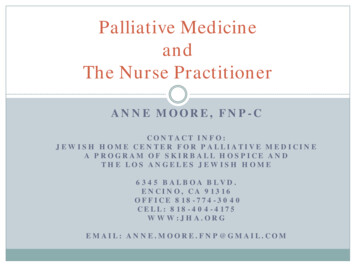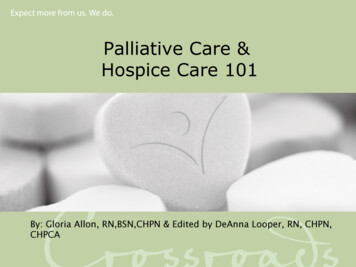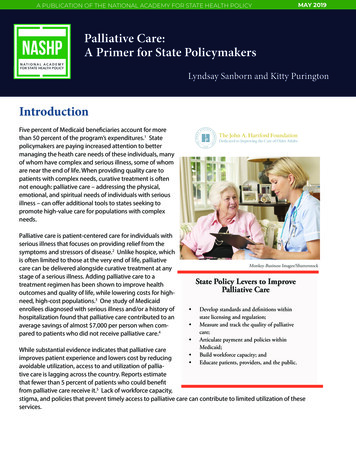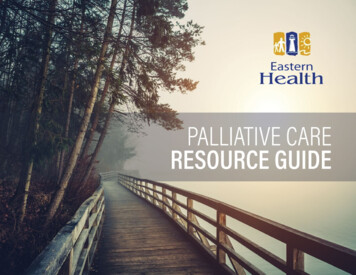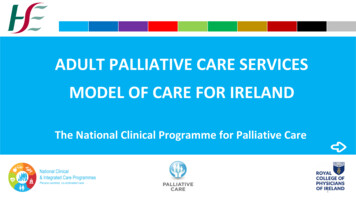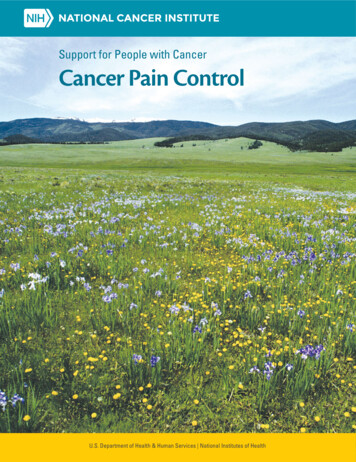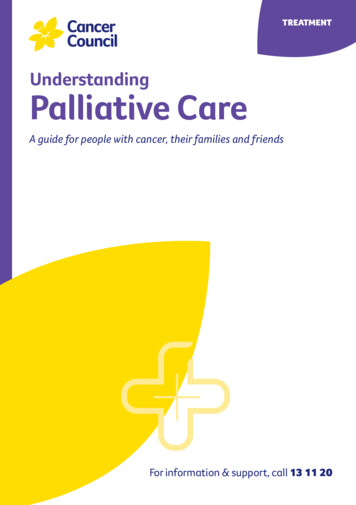
Transcription
TREATMENTUnderstandingPalliative CareA guide for people with cancer, their families and friendsFor information & support, call 13 11 20
Understanding Palliative CareA guide for people with cancer, their families and friendsFirst published September 2003. This edition August 2021. Cancer Council Australia 2021. ISBN 978 0 6489505 9 2Understanding Palliative Care is reviewed approximately every two years. Check thepublication date above to ensure this copy is up to date.Editor: Jenny Mothoneos. Designer: Eleonora Pelosi. Printer: SOS Print Media Group.AcknowledgementsThis edition has been developed by Cancer Council NSW on behalf of all other state and territoryCancer Councils as part of a National Cancer Information Subcommittee initiative. We thank the reviewersof this booklet: Dr Cynthia Parr, Specialist in Palliative Care, HammondCare and Macquarie University Hospital,NSW; Dr Lisa Cuddeford, Clinical Lead, WA Paediatric Palliative Care Service, WA; Dr Laura Kirsten, PrincipalClinical Psychologist, Nepean Cancer Care Centre, NSW; Penny Neller, Project Coordinator, National PalliativeCare Projects, Australian Centre for Health Law Research, Queensland University of Technology, QLD; CaitrionaNienaber, 13 11 20 Consultant, Cancer Council WA; A/Prof Peter Poon, Director, Supportive and Palliative Care,Monash Health, and Adjunct Associate Professor, Monash University, VIC; Dr Kathy Pope, Radiation Oncologist,Peter MacCallum Cancer Centre, VIC; Kate Reed-Cox, Nurse Practitioner National Clinical Advisor, PalliativeCare Australia; Juliane Samara, Nurse Practitioner, Clare Holland House – Specialist Palliative Aged Care,Calvary Public Hospital, ACT; Annabelle Solomon, Consumer; Silvia Stickel, Consumer; Kaitlyn Thorne, Manager,PalAssist, Cancer Council Queensland; Kim Vu, Consumer; Rosie Whitford, Social Worker – Grief, Bereavementand Community Palliative Care, Prince of Wales Hospital, NSW. We also thank the health professionals,consumers and editorial teams who have worked on previous editions of this title. We particularly acknowledgethe input of Palliative Care Australia and their permission to quote from “Brian’s Story” in A Journey Lived – acollection of personal stories from carers (2005) on page 42.Note to readerAlways consult your doctor about matters that affect your health. This booklet is intended as a generalintroduction to the topic and should not be seen as a substitute for medical, legal or financial advice. Youshould obtain independent advice relevant to your specific situation from appropriate professionals, andyou may wish to discuss issues raised in this book with them. All care is taken to ensure that the informationin this booklet is accurate at the time of publication. Please note that information on cancer, includingthe diagnosis, treatment and prevention of cancer, is constantly being updated and revised by medicalprofessionals and the research community. Cancer Council Australia and its members exclude all liability forany injury, loss or damage incurred by use of or reliance on the information provided in this booklet.Cancer CouncilCancer Council is Australia’s peak non-government cancer control organisation. Through the eight state andterritory Cancer Councils, we provide a broad range of programs and services to help improve the quality oflife of people living with cancer, their families and friends. Cancer Councils also invest heavily in research andprevention. To make a donation and help us beat cancer, visit cancer.org.au or call your local Cancer Council.Cancer Council acknowledges Traditional Custodians of Country throughout Australia andrecognises the continuing connection to lands, waters and communities. We pay our respectsto Aboriginal and Torres Strait Islander cultures and to Elders past, present and emerging.Cancer Council Australia Level 14, 477 Pitt Street, Sydney NSW 2000 ABN 91 130 793 725Telephone 02 8256 4100 Email info@cancer.org.au Website cancer.org.au
About this bookletThis booklet has been prepared to help you understand more aboutpalliative care (sometimes called supportive care). Although palliativecare is for anyone with a life-limiting illness, this booklet has beenwritten specifically for people affected by advanced cancer.The aim of palliative care is to improve your quality of life and helpyou stay independent for as long as possible. It may be beneficial forpeople at any stage of advanced cancer – not just at the end of life.Palliative care is managed in various ways throughout Australia andis adapted to each individual’s needs. This booklet offers generalinformation about palliative care. Talk to your health care team aboutthe best approach for your situation. This information may answersome of your questions and help you think about what to ask yourhealth care team (see page 48 for a question checklist).If you find reading about palliative care distressing, read what seemsuseful now and leave the rest until you’re ready. You may also like topass this booklet to family and friends for their information.How this booklet was developed – This information was developedwith help from Palliative Care Australia, health professionals andpeople affected by cancer. It is based on an Australian strategy.1If you or your family have any questions or concerns, callCancer Council 13 11 20. We can send you more informationand connect you with support services in your area. You canalso visit your local Cancer Council website (see back cover).
ContentsWhat is advanced cancer?4What is palliative care?6Who provides care?6What care is available?7How palliative care works8Key questions10Does palliative care mean I will die soon?10When can I start palliative care?10How do I get palliative care?11Can I still have cancer treatment?11Does palliative care shorten or lengthen life?12Who will coordinate my care?13Will I lose my independence?14Where can I have palliative care?15Do I have to pay for palliative care?16The palliative care team19Possible members of the palliative care team20Looking ahead24Prognosis24Advance care planning25Palliative treatment28Making treatment decisions28Types of palliative cancer treatments29Managing symptoms30Complementary and alternative therapies36
Palliative care for young people37Key to iconsSupport for young people37Icons are usedthroughout thisbooklet to indicate:Caring for someone with advanced cancer 39Carers as part of the team39Respite (short-term) care40Counselling and support41Support and information43Useful contacts43Support from Cancer Council47Question checklist48Glossary49How you can help52More informationPersonal storyTips
What isadvanced cancer?Cancer is a disease of the cells, which are the body’s basic buildingblocks. It occurs when abnormal cells divide and multiply in anuncontrolled way. There are many types of cancer and each typedevelops differently. Some grow slowly, some advance rapidly, andothers behave unpredictably. Some types of cancer respond well totreatment, while other types are more difficult to treat.The cancer that first develops in an organ or tissue is known as theprimary cancer. It is considered locally advanced if the tumour is verylarge or the cancer has spread to nearby tissues. If cancer cells from theprimary site break away and travel through the bloodstream or lymphHow cancer startsNormal cells4Understanding Palliative CareAbnormal cellsAbnormal cells multiply
vessels to other parts of the body, they can grow and form anothertumour at a new site. This is called advanced cancer, secondary canceror metastasis.The most common sites a cancer may spread to include the lungs,brain, liver and bones. A metastasis keeps the name of the originalcancer. For example, bowel cancer that has spread to the liver is stillcalled metastatic bowel cancer, even though the main symptoms maybe coming from the liver.Although medical treatments may not be able to cure advanced cancer,they may be able to slow its growth or spread, or relieve symptoms.Palliative care can also help manage symptoms and reduce side effectsat any stage of advanced cancer. This can help maintain quality of lifefor months or even years.How cancer spreadsMalignant cancerCancer cellsbreak awayCancer cellstravel to lymphnodes andother partsof the body(metastasis)Grows ownblood vessels(angiogenesis)InvadessurroundingtissueLymph vesselBlood vesselWhat is advanced cancer?5
What is palliative care?You may be reading this booklet because you or someone you know hasadvanced cancer. The health care team may have suggested palliativecare, or you may be wondering if palliative care could help.Palliative care is person-centred care that helps people with aprogressive, life-limiting illness to live as comfortably as possible.The main goal is to help you maintain your quality of life by dealing withyour physical, emotional, cultural, social and spiritual needs. This typeof care can help from the time of diagnosis, and can be given alongsideother cancer treatments. Palliative care also supports families and carers.Who provides care?A palliative approach to care may be delivered by doctors, nurses, alliedhealth professionals, volunteers and carers. Together these peoplemake up your palliative care team (see pages 19–23). Your care may becoordinated by one member of the team who communicates with you.People with more complex and ongoing needs may see a specialistpalliative care service. This service is provided by a team with extratraining and it can also provide advice to other health professionals.These specialist services can be accessed through many public andprivate hospitals, palliative care units and community-based palliativecare providers. Not everyone needs specialist palliative care.Depending on what services are available where you live, you can havepalliative care at home, in a community setting such as a residential agedcare facility, in a hospital or a specialist palliative care unit (see page 15).6Understanding Palliative Care
Person-centred care is care that treats you in the way you’dlike to be treated and listens to your needs, preferences andvalues, as well as the needs of your family and carers. It meansthat your health care provider will involve you in planning yourtreatment and ongoing care.What care is available?Palliative care offers a range of care and support options that can betailored to meet your individual needs in five areas.Physical needs – This may include: relief of symptoms such as pain,breathlessness and nausea; help with medicines; help with movement;suggesting changes around the house to make things easier and safer;and referrals to services to give your carer a break for a short periodof time (respite care).Emotional needs – This may include support for families and carers to:talk about the changes advanced cancer brings and other sensitive issues;plan for the future about what type of care you may need and whereyou would prefer to receive care; work through feelings and referral tocounselling; and help you cope with loss or grief.Cultural needs – This can include ensuring care is culturally sensitiveand appropriate.Social needs – This can: help you achieve your goals, such as howto get the most out of each day; assist with day-to-day needs; provideadvice on financial issues; and help identify or set up a support network.Spiritual needs – This involves support for your spiritual concerns,such as finding meaning, purpose and value in life.What is palliative care?7
How palliative care worksPalliative care supports the needs of people with a life-limiting illness in a holisticway. It aims to improve your quality of life and make the time you have as valuableas it can be for you and your family.Person-centred care8Where care is providedThe palliative care team willwork in partnership with you toassess what you need and makesuggestions about treatmentand ongoing care. Your caregoals may change over time.The health professionals in the palliative careteam will work with you and your carers to helpplan the best place for your care. This may be athome supported by community palliative careservices, in hospital, at a residential aged carefacility or in a palliative care unit (hospice).When to startWho provides carePalliative care is useful at allstages of advanced cancer andcan be given alongside activetreatment for cancer. Startingpalliative treatment from the timeof diagnosis can help improveyour quality of life.Your palliative care team is made up of peoplewith different skills to help you with a range ofissues (see pages 19–23). Your care may be led byyour general practitioner (GP), nurse practitioneror community nurse, or if your care needs arecomplex, by a specialist palliative care team.Understanding Palliative Care
Support servicesThe palliative care teamwill help you work outhow to live in the mostfulfilling way you can – thismight mean enjoying timewith family and friends,recording your memoriesor reflecting on your life.They can also refer youto organisations andservices that can assistwith financial, emotionaland practical needs.Family and carersWith your agreement,the palliative careteam will involve yourfamily and carers indecisions about care.They will also providethem with emotionalsupport and referralsto counselling, griefsupport, respite, andfinancial assistance.Symptom reliefPalliative treatmentcan help you managesymptoms related to thecancer or its treatment,such as pain, appetite loss,shortness of breath orfatigue (see pages 28–36).EquipmentAdvance care planningThe palliative care teamwill support you to thinkabout, discuss and recordyour values, goals andpreferences for futurecare and treatment (seepages 25–26).If you want to remainat home, the team canidentify equipment tohelp you with your dailyactivities and make iteasier for your carersto look after you.What is palliative care?9
Key questionsQ: Does palliative care mean I will die soon?A: When most people hear the term palliative care, they fear that itmeans their treatment team has given up hope or they are going todie soon. This is certainly not the case for everyone referred topalliative care. This fear is one reason that some people don’taccess palliative care services early – or at all. Palliative care aimsto maintain quality of life for people with a life-limiting illness. Itis about living in a way that is meaningful to you, within the limitsof your illness. It’s not simply about dying.Some people live comfortably for months or years after a diagnosisof advanced cancer, and can be supported by palliative care asneeded. For others, the cancer advances quickly so that their care isfocused on end-of-life needs soon after their referral to a palliativecare service. Whatever stage you’re at, your palliative care teamwill adjust your care to meet your changing needs.Q: When can I start palliative care?A: Depending on your needs, you may use palliative care from time totime or you may use it regularly for a few weeks or months. Somepeople receive palliative care for several years. This is becauseimproved cancer treatments can sometimes stop or slow the spreadof advanced disease and relieve symptoms for a number of years.The cancer may then be considered a chronic (long-lasting) disease.There is no need to wait until you need end-of-life care, as researchshows having palliative care early on improves quality of life forpeople with cancer.10Understanding Palliative Care
“ There is still a life to be lived and pleasures tobe found and disappointments to be had. Livingwith advanced cancer is a different life, not justa journey towards death.” JULIEQ: How do I get palliative care?A: To access palliative care, you will need a referral from your GP,medical specialist or other health professional. Once you knowthe cancer is at an advanced stage, you can consider havingpalliative care.Sorting out care sooner rather than later will reduce stress on youand your family. You can find out what the different team membersdo and how they can help now or in the future. It will give you timeto better understand and manage any physical symptoms (such aspain or nausea), and to consider your emotional, cultural, socialand spiritual needs.Q: Can I still have cancer treatment?A: If you have palliative care, you can still have active treatment toshrink the cancer or stop it growing. The palliative care team willwork with your cancer specialists to manage side effects fromtreatment and maintain your quality of life. Cancer treatmentssuch as surgery, drug therapies and radiation therapy may alsobe used as part of palliative treatment. In this case, the aim is notto cure the cancer but to control the cancer or relieve symptoms(see pages 28–36). You may also want to consider joining a clinicaltrial (see page 32).Key questions11
Q: Does palliative care shortenor lengthen life?A: Palliative care treats death and dying as a normal part of life. Itdoes not try to shorten life, nor does it try to make life longer.Instead, the palliative care team provides services to improve yourquality of life throughout the advanced stages of illness. This mayinclude managing pain and other symptoms. Some studies show thatif symptoms such as pain are controlled, people will feel better andmay live longer.Voluntary assisted dyingIt is important to understand thedifference between palliative careand voluntary assisted dying.Voluntary assisted dying is when aperson with an incurable conditionor illness chooses to end theirlife and uses medicines speciallyprescribed by a health practitioner.“Voluntary” means it is the choiceof the person to end their life.2Voluntary assisted dying is not partof palliative care.At the time of publication (August2021), voluntary assisted dying isillegal in most Australian states andterritories. In Victoria and Western12Understanding Palliative CareAustralia, voluntary assisted dyingis legal only for people who meetall the strict conditions and followcertain steps. Visit health.vic.gov.auor health.wa.gov.au and search for“voluntary assisted dying” to find outmore about the law in these states.Voluntary assisted dying laws havebeen passed in Tasmania and SouthAustralia, and voluntary assisteddying is likely to start in late 2022.The laws in some other states andterritories are under review.For more information and updates,visit end-of-life.qut.edu.au/euthanasia.
Finding hopeSome people avoid palliative carebecause they hope that a cure willbe found for their cancer. Havingpalliative care does not mean givingup hope. You may find that youfocus on the things that are mostimportant to you, e.g. feeling valued,having meaningful relationships orreceiving effective pain relief.People with advanced cancer mayhave palliative care for severalmonths or years and continue toenjoy many aspects of life in thattime. Some people take pleasurein completing projects, spendingtime with friends, or exploring newinterests and hobbies. Others makesense of their situation through acreative activity, such as art, musicor writing.As the disease progresses, yourgoals may change. For example,you might hope to live as comfortablyas you can for as long as possibleor you may have some unfinishedbusiness to complete, such asplanning a family trip. Palliative carecan help you achieve these goals.Q: Who will coordinate my care?A: In most cases, a GP or community nurse will coordinate yourpalliative care. If your care becomes complex, they will seek advicefrom a specialist palliative care service, but you may not see thepalliative care specialist yourself.If you have more complex health needs, such as symptoms thatare hard to control, your care may be coordinated by a specialistpalliative care service. You will usually see a palliative carespecialist, or sometimes a nurse practitioner, as an outpatient. Somespecialist palliative care services can visit you at home. You mayalso need to stay in hospital or a palliative care unit (hospice) forshort periods to have medicines adjusted or get pain under control.The specialist palliative care service will continue to consult yourKey questions13
cancer care team about your treatment. If your condition stabilisesor improves, you may not need to see the specialist palliativecare service for periods of time or you may be discharged frompalliative care.Q: Will I lose my independence?A: This is a common concern for people. Depending on your condition,you may need a little help with a few things or more help with lotsof daily tasks. This is likely to change over time.Your palliative care team will discuss practical ways you canmaintain a sense of independence for as long as possible. Theymay suggest modifications or services to help you stay athome (such as installing handrails or a ramp). They may alsorecommend or loan you equipment to help conserve your energy(such as a walking frame).For many people, maintaining control over day-to-day decisionsis important – the team will respect your wishes if you don’twant to take up their suggestions. If you feel you are losing yourindependence, you might feel angry and fear what the future holds.“ I see a palliative care person every eight weeks.Not for direct intervention but to discuss whatparticular things might be confronting me. It is asecurity to know that there is a team and individualnurses you can call upon if you need them.” BRYCE14Understanding Palliative Care
Q: Where can I have palliative care?A: You can have palliative care in different places, including: your own home at a residential aged care facility or other out-of-home facility in a hospital at a specialist palliative care unit (hospice).An important role for the palliative care team is to work out the bestplace for your care. The team will consider your care needs, yourhome environment, your support networks, and what organisationsand individuals are available in your area to help you, and thendiscuss the possibilities with you, your family and carers.You and your family may be able to choose where you want toreceive palliative care. You may be able to move between theseplaces as your needs change.Many people want to receive care at home because it is a familiarenvironment close to family and friends. If you are cared for athome, you (and anyone who cares for you) may be able to receivecommunity-based palliative care services. This can include a rangeof services on an occasional or regular basis.Depending on your situation, it may not be possible to stay athome, even with home help. Hospitals and palliative care units aredesigned for short-term stays, usually for people nearing end of life.If you cannot return home and need care for several months ormore, the palliative care team will talk to you and your carersabout where you can receive ongoing care, such as a residentialaged care facility.Key questions15
Q: Do I have to pay for palliative care?A: The federal, state and territory governments fund a range ofpalliative care services that are free in the public health system,whether you receive care at home, in a residential aged care facility,or in hospital (inpatient care).Sometimes you may need to pay part of the cost of care. Examplesof extra costs include: hiring specialised equipment for use at home paying for medicines paying for your own nursing staff if you choose to stayat home and need 24-hour assistance paying an excess if you have private health insurance thatcovers palliative care and you go to a private hospital using short-term care (respite services) that charge a fee paying the fee of a private allied health professional, suchas a psychologist or physiotherapist (you may be eligible for aMedicare rebate for up to five visits per calendar year as partof a Chronic Disease Management Plan with your GP) paying for complementary therapies, such as massage therapyand acupuncture.For more specific information, contact your state or territorypalliative care organisation. For contact details, call CancerCouncil 13 11 20 or visit palliativecare.org.au/members.If you are admitted to a public hospital, palliative care unit orother facility as a private patient and you have private healthinsurance, check what is covered with your health fund. Ask yoursocial worker about what financial help is available for patientsand carers from Centrelink and other organisations in your area.16Understanding Palliative Care
Anna’s storyMy husband had been havingtreatment for lung cancer foraround eight months when hegot very ill, very quickly. When theoncologist and nurses startedtalking about palliative care I wasterrified I wasn’t ready for myhusband to die.It is so important that someoneknowledgeable about palliative careexplains what it is. Our cancer careteam talked about how palliativecare could make my husband’s lifeeasier and more meaningful. I foundit so useful to know that help wasavailable when I needed it.a family holiday with our two boys.If I hadn’t had this support, wewouldn’t have got there.Often it was the little practicalsuggestions that were the mosthelpful – such as getting extraprescriptions and a letter from mydoctor to explain why I was travellingwith so many strong medicines, orgetting a foam wedge to help myhusband sleep.We received support in manydifferent ways, from palliativechemotherapy in hospital, to helpwith modifying our home so thatmy husband could remain asindependent as possible.I hadn’t realised that people couldgo in and out of palliative care asthey needed it. We used palliativecare services for around six months.Sometimes this was in hospitaland sometimes it was at home withsupport from a community-basedpalliative care service, but therewere times we didn’t need it. It wasonly in the last days of care that wemoved into the end-of-life stage.The palliative care team providedme with education on medicines,nutrition and so on, so that myhusband improved and we did theone thing he wanted to do – go onPalliative care gave us time formy husband to talk to family andfriends. I now think of palliative careas quality of life care for someonewith a terminal illness.Key questions17
Key points about palliative care18What it is Palliative care is person-centred care thathelps people with a progressive, life-limitingillness to live as comfortably as possible. It is useful at all stages of advanced cancer. Itis not only about end-of-life care. It helps meet your physical, emotional,cultural, social and spiritual needs. Palliative care also supports familiesand carers.How to getpalliative care Ask for a referral from your GP, medicalspecialist or other health professional. Palliative care is best started early on to helpyou maintain the best quality of life, accordingto your wishes, for as long as possible.Who provides care Care is provided by doctors, nurses, alliedhealth professionals, volunteers and carers. Specialist care is available for people withmore complex and ongoing needs.Where do youhave careCare can be provided at your home, or ina residential aged care facility, hospital orspecialist palliative care unit (hospice).What it costsMany federal, state and territory palliative careservices are free. You may need to contributeto the costs of some services.Understanding Palliative Care
The palliativecare teamYour palliative care team will be made up of medical, nursing and alliedhealth professionals, who offer a range of services to assist you, yourfamily and carers throughout your illness. Spiritual care practitionersand volunteers can offer practical and emotional support. They maysometimes form an important part of your team.Depending on your needs, your palliative care may be coordinatedby your GP, a nurse practitioner or community nurse, or you may bereferred to a specialist palliative care service. These services are madeup of a multidisciplinary team of doctors, nurses and allied healthprofessionals trained to look after people with complex health careissues. Your cancer care team will continue to be involved and willwork with the palliative care providers at all stages of the illness.You will have regular appointments or visits with some of the healthprofessionals in your team so they can monitor your progress andadjust your care. The most common palliative care team members arelisted in this chapter. You won’t necessarily see all these people – someroles overlap and access to palliative care specialists varies acrossAustralia. Your GP, nurse or palliative care specialist can help youwork out the types of services you’ll need.If you are being treated at end of life and you have cultural or religiousbeliefs and practices about dying, death and bereavement, or particularfamily customs, let your palliative care team know. Aboriginaland Torres Strait Islander health workers work with other healthprofessionals to provide care that is respectful to culture.The palliative care team19
Possible members of the palliative care teamGeneral practitioner(GP ) or family doctor continues to see you forday-to-day health careissues if you are beingcared for at home (andmay be able to makehome visits) talks with your nurseand/or palliative carespecialist to coordinateyour ongoing care can refer you to apalliative care specialistfor help with morecomplex needs can organise youradmission to hospitalor a palliative careunit (hospice) if yourcircumstances change offers support to you,your family and carers can provide referralsfor counselling,including bereavementcounselling for familyand carers, if needed20Understanding Palliative CareNurse may be a communitynurse or a specialistpalliative care nurse may work for ahospital, communitynursing service,residential aged carefacility or specialistpalliative care service if you are beingcared for at home,will visit you in yourhome and mayprovide after-hourstelephone support coordinates otherhealth professionalsin the team and worksout what care youneed, including homenursing or help withpersonal care
Peter MacCallum Cancer Centre, VIC; Kate Reed-Cox, Nurse Practitioner National Clinical Advisor, Palliative Care Australia; Juliane Samara, Nurse Practitioner, Clare Holland House - Specialist Palliative Aged Care, . of care can help from the time of diagnosis, and can be given alongside other cancer treatments. Palliative care also .
